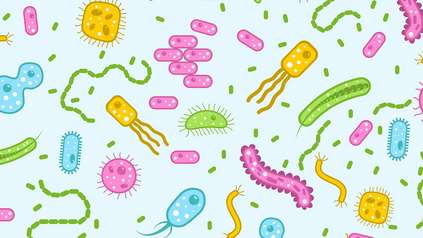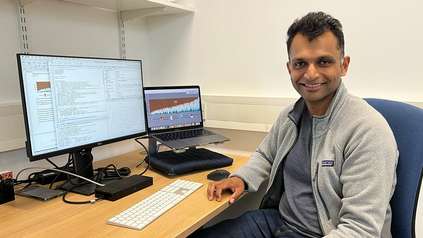Baby’s microbiome may protect against childhood viral infection
Listen to this news story:
Listen to “Baby’s microbiome may protect against childhood viral infection” on Spreaker.
A baby’s makeup of gut bacteria — their microbiome — which starts to form as soon as they are born, could help protect against viral infections later in childhood, a new study suggests.
As part of the largest study of UK baby microbiomes to date, researchers at the Wellcome Sanger Institute and University College London (UCL) found that babies with a specific mix of gut bacteria at one week old, which was only found in some babies born vaginally, were less likely to be hospitalised for viral lower respiratory tract infections (vLRTI) in the first two years of life.
This research, published today (4 June) in The Lancet Microbe, is the first study to show an association between the makeup of the gut microbiome in the first week of life and hospital admissions for respiratory infections in early childhood. The team did this using whole genome sequencing and analysis of stool samples from 1,082 newborns and then using their electronic health records to track admissions to hospital up to the age of two years old.
Building on previous findings from the UK Baby Biome Study1, this new research suggests that certain microbiome compositions could give different benefits, such as protection against viral infections.
While further research is needed to prove this link, these findings could help shape future research and prevention efforts for childhood respiratory diseases, including the development of effective infant therapeutic probiotics to reduce the risk of respiratory infections in infants.
Overall, this study sheds more light on how the gut microbiome in early life plays a role in our future health and underscores the importance of even larger studies such as the Microbes, Milk, Mental Health and Me (4M) project2.
The gut microbiome is a complex ecosystem of millions of microbes that are vital for human health and important in immune system development. As it begins to form immediately at birth, the first month is the earliest window for intervention that could be used to restore or boost the microbiome.
Previously, the team found that babies born vaginally have a different microbiome compared to those born via caesarean section (C-section), although the differences largely evened out by the time the child was one-year old3. A different study from the same team also found that all UK babies have one of three bacteria within the first week of life, called pioneer bacteria. Two of these, Bifidobacterium longum (B. longum) and Bifidobacterium breve (B. breve), are considered beneficial as they help promote the development of a stable microbiome4.
In new research that builds on both of these studies, the team at the Sanger Institute and UCL analysed stool samples from 1,082 newborns to understand how pioneer gut bacteria acquired in the first week of life may affect their health outcomes later in infancy. The researchers then looked at electronic health records to track admissions to hospital from birth and up to the age of two, and see if there was any association.
The researchers found some babies born vaginally, with a higher amount of pioneer bacteria B. longum in their early gut microbiome, alongside other similarly beneficial Bifidobacterium and Bacteroides species, such as B. bifidum and B. dorei, had a lower risk of being admitted overnight to hospital for vLRTI, when compared to all other babies. This was still seen after taking account of important confounders, such as babies receiving antibiotics, and whether babies were fed with breastmilk, formula, or both.
However, not all babies born vaginally had the same microbiome composition. The team identified two other groups of babies based on their microbiome profile, who had a higher risk of hospital admission for vLRTI compared to those in the B. longum group. These other microbiome profiles were found in babies born vaginally and by C-section.
It’s important to note that the team observed this finding as an association, otherwise known as correlation, and further research is needed to prove any causal links. While this study has examined only one common health outcome in children — respiratory viral infections — future research with a much larger cohort is needed to investigate whether the possible protective effects of B. longum, or other potentially beneficial pioneer bacteria such as B. breve, may be linked to other health outcomes. The researchers aim to explore this in the upcoming 4M study.
“Viral lower respiratory tract infection is one of the leading causes of hospitalisation in young children, and our research raises the possibility that certain early gut microbiomes might help lower this risk. Further research to confirm and explore the factors behind this, including if there is an interaction between the gut microbiome and the lung microbiome, could lead to new ways to help prevent respiratory infections in childhood.”
Dr Cristina Garcia-Mauriño, first author of the study at UCL
“While observational, our findings that certain infant microbiomes are linked to a lower risk of viral respiratory infection in childhood are striking and new. This is the first time that this association has been observed, and it was only possible due to the size of the Baby Biome Study, and by combining high-resolution genomics technologies with clinical outcomes. To understand more about how our microbiome impacts health, larger studies such as the 4M project are crucial, and I am looking forward to insights from both the Baby Biome Study and 4M that will further shape our understanding of how our microbiomes and our health interact.”
Professor Nigel Field, senior study author at UCL, and co-lead of the Microbes, Milk, Mental Health and Me (4M) project
“A Caesarean section is often a life-saving procedure, and can be the right choice for a woman and her baby. Furthermore, decisions around childbirth are personal and complex, and there is not one single approach that is best for everyone. While this study suggests that some babies born vaginally may be less likely to experience severe respiratory infections, this was not seen across all babies born this way, suggesting that other factors are at play. Further research is needed to create a full, nuanced picture and to help find new ways to ensure advice and clinical approaches are tailored to personal situations.”
Professor Louise Kenny, Lead Investigator of the Children Growing up in Liverpool (C-GULL) study and previously a Consultant Obstetrician and Gynaecologist, who was not involved in this study
“Within the first few days of our lives, our microbiomes are already thriving ecosystems that develop and adapt with us as we age. Our study adds to the growing body of evidence that the pioneer gut bacteria acquired in early life may influence health later on, highlighting how gut microbes could help protect us from infections and other diseases. Different types of infant gut bacteria may provide different benefits, and understanding these could pave the way for developing targeted infant probiotics to support early microbiome development. In the future, we might be able to create personalised interventions that optimise a child’s gut microbiome based on their unique microbial profile, promoting better health and development.”
Dr Trevor Lawley, senior study author at the Wellcome Sanger Institute, and co-lead of the Microbes, Milk, Mental Health and Me (4M) project
More information
The researchers would like to thank the participating families for their time and contribution to the Baby Biome Study and the research midwives at the recruiting hospitals.
- The UK Baby Biome Study is a large-scale UK birth cohort study and biobank, with longitudinal follow-up through electronic health data linkage. It aims to understand how interactions between microorganisms, the immune system, and clinical, social, and behavioural factors during pregnancy and early life influence later health and disease. Stool samples were collected from newborns and mothers, along with vaginal swabs from the mothers and umbilical cord blood. Funded by Wellcome, it was a collaboration between the Wellcome Sanger Institute, UCL, the University of Birmingham and collaborating hospitals. The study webpage can be found here: https://www.ucl.ac.uk/global-health/research/a-z/baby-biome-study
- Sanger Institute and UCL researchers and collaborators are building the most detailed dataset on microbiome development in the world to unlock new insights into human health, specifically focusing on how the microbiome impacts mental health. This project, called ‘Microbes, Milk, Mental Health and Me’ is part of the new Children Growing Up in Liverpool (C-GULL) study. Funded by Wellcome, this study will track the health of 10,000 babies and their families, from early pregnancy to childhood. It aims to unravel the complex interactions between genetics, environment and early life exposures on long-term health outcomes and seeks to explore how factors such as the infant gut microbiome and early life feeding affect brain development, behaviour, emotions and mental health later in life. Volunteer registration is currently live, for more information, please visit: https://www.cgullstudy.com/taking-part/
- The previous 2019 study analysed 1,679 samples of gut bacteria from nearly 600 healthy babies and 175 mothers. It found that babies born vaginally have different gut bacteria than those delivered by caesarean. It showed that vaginally born babies got most of their gut bacteria from their mother’s gut, not their vagina as previously thought. Babies born via caesarean did not acquire the bacteria from their mothers and instead had more bacteria associated with hospital environments. The researchers found that the differences in gut bacteria between vaginally born and caesarean-delivered babies largely evened out by one year old. The full release can be found: https://www.sanger.ac.uk/news_item/babies-gut-bacteria-affected-delivery-method-baby-biome-project-shows/
- This previous 2024 study found that newborn babies have one of three pioneer bacteria in their gut shortly after birth, one of which (B. breve) could be used to develop new personalised infant therapeutic probiotics. Researchers from the Wellcome Sanger Institute, UCL, and the University of Birmingham, used whole genome sequencing to analyse stool samples from 1,288 healthy infants, all from the UK Baby Biome Study. They found that B. Breve was genetically adapted to make full use of the nutrients in breast milk, suggesting that it is the most suited to thrive in a baby’s microbiome. The team uncovered that this bacterium can also block pathogens from colonising the babies’ gut, highlighting its significant potential as a natural probiotic. Along with B. breve, B. longum is considered beneficial as it promotes the stable colonisation of other beneficial microbes, and the third, E. faecalis is considered risky. They also showed that a bacterium commonly found in commercial infant probiotics known as B. infantis was not a pioneer bacterium, and is rare in UK infants. The full release can be found here: https://www.sanger.ac.uk/news_item/natural-probiotic-discovered-in-uk-newborns-microbiomes/
Publication:
Garcia-Mauriño, Y. Shao, A. Miltz, et al. (2025) ‘Investigation of associations between the neonatal gut microbiota and severe viral lower respiratory tract infections in the first 2 years of life: a birth cohort study with metagenomics.’ The Lancet Microbe. DOI: 10.1016/j.lanmic.2024.101072
Funding:
This research was funded by Wellcome and the UCL Institute for Global Health. A full acknowledgment list can be found on the publication.
Author interests:
Alongside his role as Group Leader at the Wellcome Sanger Institute, Dr Trevor Lawley is also a co-founder and Chief Scientific Officer of Microbiotica. This is a clinic-ready biopharmaceutical company specialising in the development of precision live biotherapeutic products for adults, with lead products in immuno-oncology and inflammatory bowel disease.





